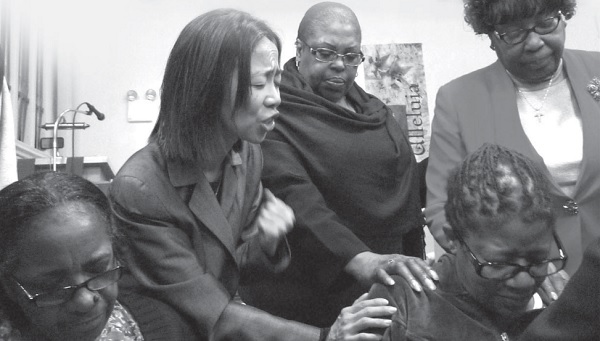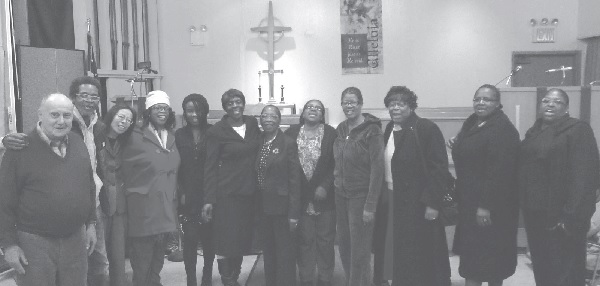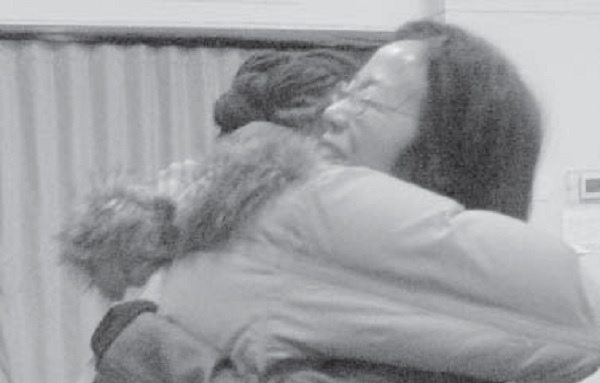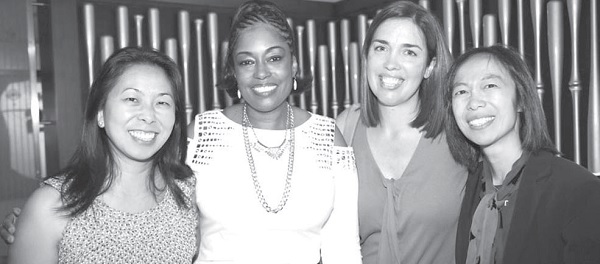Dive deeply into the beautiful places
A Chinese-American female pastor looks at the path of justice for African-American churches
Translated by Wu Xinhui
Photography, photo provided/Manni Lee

▲When a police officer was killed in New York City due to racial issues, Pastor Mei prayed urgently for the female police officer and her family at the church prayer meeting.
He said, "The Lord's Supper is not given to those who deserve it, but to those who need it."
These words make me feel at ease and full of gratitude,
Because I don’t have to be “good enough”, the Lord Jesus is the best.
God really loves me. I grew up in a Chinese church and have been exposed to Sunday pulpits, fellowship activities, prayer meetings, Bible studies, and summer or winter camps since I was a child. Under the leadership and influence of my brothers and sisters, church activities have become the focus of my life. The Sunday school teachers and fellowship counselors took me to watch birds, invited me to watch my first American football game, accompanied me to distribute gospel tracts, turned Bible teachings into my life, cared for me and counseled me when I had difficulties, and also gave me the opportunity to learn leadership. . The Chinese church baptized me, trained me, and encouraged me along the way to study in seminary.
After I pastored a Chinese church for ten years, God led me to where I am now - Emmanuel Presbyterian Church, an interracial church located in the Lower East Side of New York City, where most of the African Americans are African Americans (about For Asian female Feng Mu’s response, please see the notes at the end of the article). 1 Let me share my experience of taking root and serving in an African-American church.
God’s righteous mind
It was in seminary that I first heard “God has a righteous heart.” Every word in the Bible shows the Creator's concern for "orphans and widows" and reminds the rulers of Israel of their responsibility to care for the poor, vulnerable, and foreign residents. Ancient prophets in the Bible sought to curb violence and injustice and rebuked kings who turned a blind eye to evil deeds. Those in power accommodate the rich and powerful, exploit the poor, and turn a deaf ear to their cries of pain. Although I have been listening to evangelical churches for many years, I cannot feel or see God’s will in this regard.
Yes, the Good Shepherd always returns for the lost sheep, but the Almighty King also has the will to redeem the entire community. Our Savior has noticed the plight of the vulnerable, and He desires to heal those who are hurt, neglected, or abused. Isn’t the Redeemer and Holy Spirit the Comforter also determined to restore the proper social, political and economic order? Just as the gospel frees people from sin, its liberating power restores the "heart" of entire nations—from improved educational opportunities, wages, health care, housing construction, better public security, clean government, and reforms Immigration law and so on.

▲Pastor Mei Guoping (third from left) serves cross-ethnic groups and takes a photo with some members of Immanuel Presbyterian Church in New York, where he pastors.
Relying on God to seek justice from pain
However, in building the kingdom of God, what proportion of the church is involved in this kind of salvation ministry? What about the evil deeds of the organization? The African American church actively advocates social justice and equality. The history of the church is the reason why I look forward to joining. After graduating from seminary, I was sent to Roxbury Presbyterian Church in Boston, an African-American church. Although I was the only non-black Asian face in the hall, everyone's cordial greetings and acceptance, and no one asked about the reason for my appearance, and their easy-going and relaxed attitude always made me feel at ease.
Worship at Roseberry Church is always lively, with members enthusiastically singing hymns and sometimes singing gospel hymns or spiritual songs from the bottom of their hearts. Black Americans were considered slaves in the past, so their songs are as powerful as a deep pool. These poems are spiritual songs composed from the depths of the hearts of those who have experienced grief. Their voices convey the unspeakable pain and sorrow of being discriminated against. The Lord Jesus endured abuse and beatings, his beard was mercilessly torn off, and his body was brutally nailed to a wooden frame. Such severe injuries were only caused by twisted justice, causing Him to be punished for crimes he had not committed.
Is there any black American who has not suffered the harm caused by racial discrimination? But these brothers and sisters did not allow anger and resentment to fester, nor did they allow the entire social system to remain oppressive or unregulated. Many African-American churches came forward. They first praised Jesus Christ, who sits at the right hand of God the Father, and asked Him to protect and be gracious to the people. They then asked the government to fulfill its due responsibilities through political channels and protest statements. Throughout American history, African American churches have become catalytic centers of worship and social movements, speaking out for the people in the public sphere and properly utilizing their influence.
Start by giving back to the community and reuniting families
At Roseberry Church, we regularly pray for presidents, government agencies, and the world, and politicians often visit us. The mayor consulted with local African-American pastors to provide advice or counseling. My first service as an intern preacher in the church was to care for unwed pregnant teenagers. I worked with community health units to provide care and medical assistance to young unwed mothers.
African American churches deeply understand that community building is closely related to church prosperity. There are retired judges, doctors, teachers, businessmen, scientists, and civil servants working in Boston's public agencies in the church. There are also members of families suffering from sickle cell anemia, addicts, and members in prison. Regardless of background or profession, the church expects everyone to give back to the community. Isn’t this the calling of Christians? "Giving back" is not limited to family or friends, but also "giving back" to the hometown through effective services and supporting community activities.
In African American culture, family is highly valued. I remember one Sunday, a little boy wearing a brown suit and tie came to the meeting. When introducing himself, the boy, who was under twelve years old, stood up without fear, stated his name confidently, and explained that he was here to visit his grandparents. This shows that the boy's mother has taught him well. Many African-American families often hold family reunions, inviting not only core members but also relatives and friends from all over the country. Such family reunions require careful planning and savings for a whole year, and also require a preparatory meeting to be held. My prayer partner One of them is the accountant of the family reunion. Many adult children call their parents every day to express concern or simply say, "I love you!"

▲In a warm and warm embrace, the Asian pastor and the African-American church member were family-like in the Lord.
podium for dialogue
Stories help spread the word. In African churches, it is indispensable to preach life-oriented messages and words that inspire family affection. The words, stories, and metaphors of the Bible become real and alive in the ups and downs of the beat and rhythm. Growing up, I attended these evangelical meetings or revival meetings, but in the African American church, it was a weekly gathering. Interactive worship encourages listeners to naturally express their emotions out loud, even during the sermon.
An African-American pastor (also my mentor) was assigned to serve in a Chinese church. Most Chinese members show respect for the speaker by listening quietly. After a few weeks, the pastor became discouraged because no one was responding to her. During a retreat, the pastor mentioned to members that she was used to listeners interacting with her to express their recognition and participation in the message. The next day, when she was preaching on the stage, the Chinese church members held up their homemade "Amen" and "Well said!" signs to the gathering. Seeing this scene, the pastor couldn't help but laugh along with everyone!

▲Pastor Mei Guoping (first from the right) happily takes a group photo with the WOW (Women of Wonder, translated as "Our Fellowship") team to help sisters develop their God-given talents and do their best to glorify God.
A resting place in worship
During the five years of serving at Roseberry Church, every week’s messages inspired and changed my heart and mind, making me willing to get closer to God. At the end of the message, the pastor called those in need to come to the stage to receive prayers and pray for God to give him power and strength for the challenges at hand. Our faith is bright and glorious, and for me, the experience of participating in the African American church has convinced me that everything God has given us - emotional, intellectual, and physical - is part of the spiritual. When I raise my hands and slowly sway to the music, or praise loudly, or lean forward to pray, I can truly lie down in a resting place in my heart.
From time to time I still hear pastors inviting people to receive Holy Communion, saying, "Communion is not for those who deserve it, but for those who need it." This reassurance makes me feel at ease and filled with gratitude because I don't have to be "good enough." The Lord Jesus is the best.
Serving in an African-American church has led me to a world of freedom and acceptance. I understand that I am a person who has received blessings, so I need patience and kindness. The food I need cannot be bought with money. When I was most in need, the Lord Jesus was not stingy. He did not want me to struggle for salvation on my own, nor did He require me to meet His high standards. He only sought me out and conquered me with love. Out of love and acceptance, I open my arms to embrace the Father and God of the world, who is not limited by culture but is the embodiment of mercy. I have experienced the power of God’s peace to remove walls and become a loving community that pleases Jesus. Mission does not need to begin with traveling to a distant place; it only needs to begin with welcoming neighbors.
Of course, I don’t always have to describe how God shows up in our church, but I know He will show up. Isn't that what life is like? Hear God’s voice, see God with your own eyes, and experience God’s love and power by participating in worldly affairs. Whenever we gather in the name of the Lord, we can experience the fullness of God’s presence. I believe that God will continue to guide me and enable me to experience Him more. I think this is the reason why God allowed me to grow up in the Chinese church, but to take root in the African church.
Note:
‧ To reflect on the issue of women's ordination in an Asian context or to lead your congregation through a helpful journey of discovery, consider the suggestions in “The Way Home: Sisters and Brothers Serving Together” by Grace Y. May and Peter K. Yi , chapter 6 of Honoring the Generations: Learning with Asian North American Congregations, ed. M. Sydney Park, Soong-Chan Rah and Al Tizon (Valley Forge, PA: Judson Press, 2012), pp. 100-119.
 Author profile
Author profile
Pastor Mei Guoping is currently the pastor of Emmanuel Presbyterian Church in New York City, USA, and the CEO of WOW (Women of Wonder, translated as "Our Fellowship"). WOW is a group of Christians who are fully committed to women's ministry, aiming to help sisters develop their God-given talents and do their best to glorify God. Pastor May grew up in New York City and graduated from Yale University and Gordon-Conwell Theological Seminary. He has pastored African American churches and Chinese-speaking churches in Boston, as well as the First Presbyterian Church and China Mission in New York City. This magazine specially invites her to share her cross-ethnic and cross-cultural service experience with readers.
